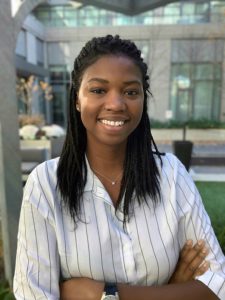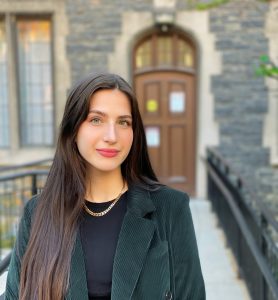Anti-Oppression Workshops An Important First Start to Allyship
November 10/2020
by Françoise Makanda, Communications Officer at DLSPH
A recent anti-oppression training session offered an important start to conversations on equity for first-year DLSPH health promotion students, according to study leads and DLSPH alumnae Gifty Djulus and Natasha Yasmin Sheikhan.
But post-workshop results showed that most participants wouldn’t feel comfortable applying lessons learned to their work in public health.
Anti-oppression workshops allow participants to understand the lived experiences of ‘disadvantaged’ groups in relation to their own or lack of privilege.
Although they study health promotion, many DLSPH students came into the session offered last year without an understanding of anti-oppression, says Djulus. And although three-quarters of the students surveyed said the workshop made them more aware of their personal biases, the study leads found that this knowledge might not have real-world impact.
“We noticed that students were more aware of what anti-oppression means and the definition of positionality, but they did not feel as though they could move forward in confidently applying these practices within the public health field,” says Djulus.
Through qualitative and quantitative data under the guidance of Prof. Ananya Banerjee, the pair unearthed important findings. Despite the subject matter – or perhaps because of it – they found that racialized students would benefit from supports, such as a safe space, a place where racialized students can truly express themselves. White allies, in turn, must be willing to listen, consider allyship development as a lifelong process beyond the workshop, recognize performative allyship and learn when to be proper advocates.
Sheikhan says there is practically no research on the effectiveness of anti-oppression workshops, so the pair included post-event surveys.
Racialized students reported that the workshop did not go in-depth enough while white students said that it was just enough. “One of the main recommendations was that we need to create conducive environments for our racialized students who feel as though they still don’t have a voice,” says Djulus. “Even though this is a workshop meant for them to have a discussion, they still didn’t feel safe.”
Both alumnae are still navigating these waters as racialized public health practitioners in the real world. As a Black woman, Djulus says she is always inserting, when she can, social determinant of health and race angles in work projects.
“In a lot of the environments I worked in, EDI was a buzz term,” she says. “I realized we’re not moving in the right direction. Even if we’re having these dialogues, we’re not effectively communicating. Everyone needs to be clear what I’m trying to advocate for.”
Sheikhan sees the benefits of attending these workshops: The material from anti-oppression training cannot be memorized or studied.
“It’s hard to unsee when you have been exposed to health equity and anti-oppression,” says Sheikhan, who is of Iranian descent. “Every project I am working on, I am always thinking about an anti-oppression and health equity lens and I bring it up to my supervisors every single time. Bit by bit, we can all make a difference.”
Students made clear they appreciated receiving anti-oppression training, say the leads.
“We recognize that the field of public health is not as diverse as it should be and we recognize that students are not well equipped to be able to act as allies and advocate,” says Djulus. “Workshops like this are just the start. Anti-oppressive practices need to be woven into everything we do as public health professionals.”
Study leads believe that the training should be mandatory in all public health pedagogies. However, it is up to participants to continue their anti-oppression training as they progress through their professional journeys. Changing societal patterns is an ongoing process that goes well beyond a single anti-oppression training, notes Sheikhan.
Djulus and Sheikhan were part of an MPH student advisory group for anti-oppression training alongside alumni Emin Nawaz, Joseph Friedman Burley, Tyla Thomas-Jacques, Kahiye Warsame, Harsh Naik, Marium Jamil and lead Prof. Ananya Banerjee who made the study possible.

